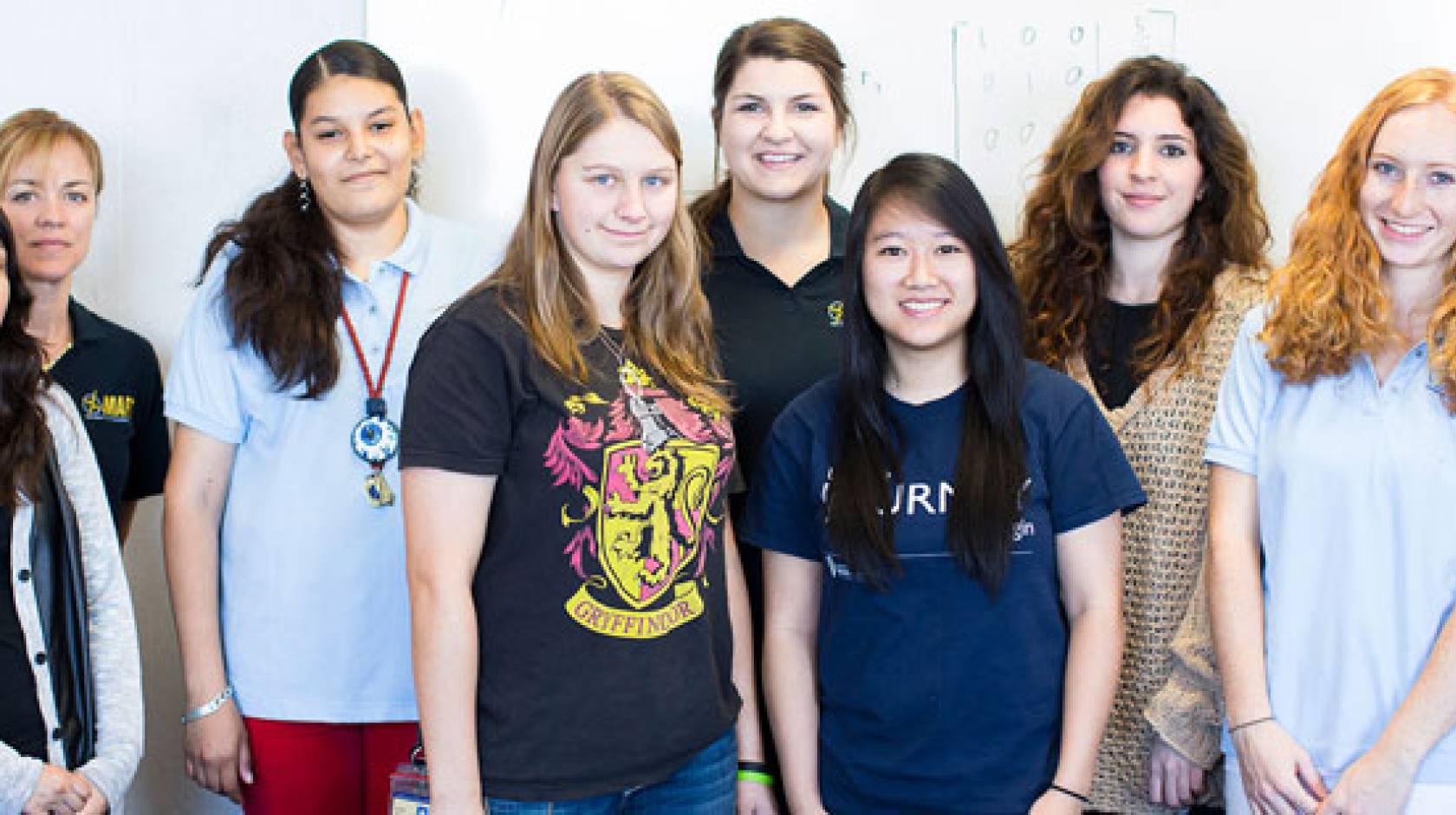Nicole Freeling, UC Newsroom

You put in the hard work, made the grades, and have now landed at college. Cool, right?
Except that now you’re starting to wonder if you actually belong here. Maybe you don’t see a lot of students that look like you in your classes. Or you might have just received your first bad grade — ever — on a quiz.
Whatever it is, fear not. You are surrounded by people who want to help you succeed — including these four trailblazing young women in STEM who are willing to share their hard-earned advice about how they found their way.
These women know of what they speak. Not only were they the first in their families to go to college, but they have pushed forward in male-dominated fields like math, physics and engineering. In short, these women know what it feels like to be an outsider. And yet they still persisted.
You may fail a class, so find your people — Mia Arnold, mathematics major, UC Irvine
Mia Arnold is a peer mentor with UC Irvine’s Foster Youth Resilience in Education program. She also works with teens in foster care, to urge them to aim for college and is a member of CalTeach, which prepares STEM majors for careers as K-12 educators in high needs schools.

Courtesy photo
It happened in the fall quarter of freshman year: My first failing grade! After being a top student throughout high school — especially in math, my favorite subject — I found myself struggling to pass both calculus and classical physics.
Just as in high school, I had worked hard and studied, but something wasn’t clicking. I forced myself to go to the on-campus tutoring. There I met other students who, like me, found their old study habits from high school weren’t cutting it for their newly demanding and rigorous course load.
We started to work together under the supervision of the teaching assistants, and I saw my comprehension improving.
In high school, I had always studied alone. Working with a group helped us learn from and support each other.
Thankfully, I passed both classes. But learning how to learn in college is an ongoing process. Being a math major meant I had to think more abstractly than before. I needed to aim for understanding rather than high grades.
Luckily, I have support from my study buddies, who have turned into some of my closest friends. Juggling a heavy load of classes, a job and extracurricular responsibilities can be draining. But I have a network I can go to for support — one that goes way beyond helping with math. That’s helped make my whole college experience easier, more rewarding and more fun.
Don’t give in to impostor syndrome — Bethania Perez, mechanical engineering major, UC San Diego
Bethania Perez is a first-generation Latinx student from Pico Rivera, Calif., a historically low college-going community. As a high school student, she served on the board of Michelle Obama’s Reach Higher Initiative to inspire more underrepresented high school students to go to college. She recalls seeing few students who look like her in mechanical engineering, and now serves as a peer mentor with clubs for women and Latinx students pursuing careers in engineering.

Courtesy photo
As the first in my family to go to college, as well as a woman in the male-dominated field of engineering, I struggled a bit with impostor syndrome. Self-doubt and the nagging fear that others would see me as unworthy kept me from applying to internships, leadership opportunities and other programs that attracted me. I worried I was not smart enough for graduate school, not strong enough to be a leader and not experienced enough to obtain an internship. I rejected myself before anyone else could!
Through student organizations like the Society of Hispanic Professional Engineers and the Society of Women Engineers, I was able to find mentors who had navigated similar issues. They advised me to stop comparing myself to others and to focus on my own path.
I started applying to opportunities — even those for which I did not meet all of the qualifications — and it paid off! Going into my third year of college, I have a leadership role in the organization Society of Hispanic Professional Engineers, as well as a job performing data quality control at the Scripps Institution of Oceanography, at a lab on the forefront of oceanographic research.
My advice to other young women: Embrace who you are, know your worth and believe in yourself. Join an organization you identify with and surround yourself with people who support and lift you up. Ultimately, don’t forget the hard work you did to get to where you are and enjoy the whirlwind that is college!
Work with your academic adviser — Genesis Urbina, biology major, UC Riverside
Genesis Urbina is an active member of Alpha Pi Sigma, a Latina-based sorority focused on academics and community service. She also works with elementary school students as an AmeriCorps tutor and is a member of Kaiser Permanente’s Health Scholars program.

Courtesy photo
My family and I were always focused on the fact that I would go to college. As a first-generation college student, though, I was often lost and confused as to how higher education worked.
When it came time to register for my sophomore year of classes, I went for what is known as the triple threat: biology, organic chemistry and physics. To me, it seemed like the best way to take the classes I needed in one go.
Big mistake! Each of the classes had a lab and discussion section on top of the lecture, and the workload was overwhelming. I became stuck in a cycle of cramming for exams rather than investing the time I needed to thoroughly understand the material. That quarter, I failed my first class ever. Not only that, because of the weak foundations I had developed, I had to work extra hard to catch up in the classes that built on that material.
Now I’m back on track in my major; it’s just taking me a little bit longer to graduate. But I advise everyone to speak to their academic adviser before registering for classes in order to create a short- and long-term plan. Be careful not to overextend yourself — not just for the sake of grades, but so you can devote time to each subject and really learn it. After all, that’s what college is about.
Speak up and reach out — Kristie Diep, bioengineering major, UC Berkeley
Kristie Diep has been drawn to STEM ever since participating in the nationwide Science Olympiad competition as a seventh-grader. She decided on bioengineering after her father began relying on a prosthetic leg in 2016 and was inspired by these events to involve herself in a career that would allow her to design affordable, highly-functional prosthetics and medical devices. Diep is an officer in the Bioengineering Honor Society at UC Berkeley.

Courtesy photo
Second semester of freshman year, I faced some difficult classes and thought the solution was to study during every spare moment.
I had always loved my classes and enjoyed learning. But after weeks of feeling exhausted and isolated from my closest peers, I forced myself to look at my situation rationally. It became clear that my methodology was not working.
I needed to leave myself time for friends — but I also needed to make hard choices about how to budget my limited free time. I began nurturing the friendships most valuable to me instead of trying to salvage every relationship I had formed. If I couldn’t go out for a whole evening, I’d take a break from a tiring study session and find a friend to grab some ice cream. These small outings were a great way to catch up with people and recharge — and, in turn, helped me better focus on my studies.
At first, it was hard to reach out to friends and tell them I was having a hard time. I have always been stubborn with the idea that I could manage things on my own. But I found the courage to do so, and it has paid off tremendously. The people around you are a safety net — ready to pick you up after a stumble and remind you that you are never alone on your journey.
I always thought of college as a place to learn and do well academically — but it also offers so much more. Now, I am enjoying and loving my time here instead of just focusing on classes and grades. Because I spent time to nurture friendships, this really feels like the place I belong.

